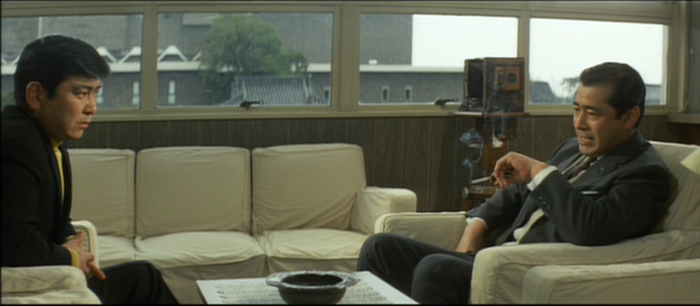“What do you care about humanity? You’re a typical representative of your country, captain. A great benefactor – as long as you get the public acclaim you want. The saviour of the world – as long as the world does what it is told to do. You want peace – but on your terms. Captain Allen, you are America!”
These words are spoken, or rather spat out, by Yujiro Ishihara in a film with the English title of “The Walking Major” and the Japanese title of “Aru Heishi no Kake” (“A Soldier’s Bet”).
The character played by Ishihara is an investigative photojournalist who has witnessed Captain Allen’s killing of unarmed civilians in the Korean War. Now Allen has become a celebrity in Japan, where he is stationed, by embarking on a two week march from Camp Zama, near Yokohama, to Beppu in Kyushu, 870 miles away.
The idea of this gruelling, near-impossible feat is to raise funds for an orphanage in Beppu. The photojournalist is the only person who knows Allen’s dark secret. The confrontation between them takes place in a crematorium where the major and the G.I. who has been “volunteered” to accompany him are bunking down for the night.
The film is set in 1960 but was made in 1970. The photojournalist’s angry denunciation of what he sees as Allen’s hypocrisy reflects the frustration that young Japanese felt about their country’s passive involvement in the Vietnam War. American bases in Japan were crucial staging posts for U.S. military operations, including bombing raids on North Vietnam.
Yet the film was authorized by the US military authorities in Japan, as the credits make clear. The American soldiers we see are good guys. The killing of the Korean family was a tragic mistake, rather than an atrocity. Yes, the Americans are problematic, but what can Japan do without them?
That’s a conundrum that has yet to be solved half a century on – and may well never be.
Yujiro Ishihara, younger brother of Shintaro Ishihara, the writer and politician, was a huge star at the time. Often likened to James Dean, he had set up his own film production company. A Japanese star of an earlier generation, Toshiro Mifune, had done the same thing. Both men found it hard to translate their acting fame into commercially successful productions and ended up in financial trouble.
So it is no surprise to see Mifune taking a small part in a Ishihara Productions film. In the role of the impetuous photojournalist’s boss, he offers instant alpha male credibility. When his character references the forced marches he experienced during the Pacific War, he conveys a sympathetic understanding of what war does to people through tone of voice and gesture.
Mifune himself was called up into the Imperial Japanese Army. In his four year stint, he didn’t see action but did work on a base where young kamikaze pilots were trained. He could play military men of all kinds in his sleep – from Admiral Togo, who destroyed the Russian fleet in 1905, to Minister of War Anami, who committed seppuku the day after Japan’s surrender in 1945.
His character in the film has a more nuanced view of the media’s social role than Yujiro’s. “When there’s a beautiful story, if you dig up the roots you often find something dirty. But it’s not necessarily our job to bring that to people’s attention. We should value the straightforward dreams of the public and leave the roots alone.”
So what will Yujiro do? Publish the unvarnished truth and deprive the orphans of their new orphanage? Or let a killer of innocent civilians be celebrated as a benign “Santa Claus” figure? That is the dilemma on which the drama hangs.
“The Walking Major” was Yujiro Ishihara’s attempt to make an international film. The cast was impressive. Cliff Robertson, an Oscar winner, played Captain Allen, with his wife of the time, Dina Merrill, playing his wife in the film. Frank Sinatra Jnr. contributed an affable performance as the Captain’s happy-go-lucky marching comrade.
He also demonstrated some of his father’s vocal talent with a rendition of “Re-enlistment Blues.” The song, originally sung by Merle Travis in the film “From Here to Eternity”, is staged in a Suntory beer factory, with a half-drunk Frank Jnr. surrounded by female factory workers!
On the Japanese side, apart from Ishihara and Mifune, there were big names like Frankie Sakai and Michiyo Aratama in the cast. The story, supposedly based on real events, was written by prolific dramatist James Miki and direction was by Keith Larsen and Koji Chino.
The film was nominated for a Golden Globes award in 1972 but is little talked about today. It’s an interesting piece that mixes war trauma, humour and pathos in an unusual but effective way. Yujiro’s tendency to over-act is occasionally evident, but Sinatra, Robertson and Mifune are very good.
The version available on Amazon Prime Japan is in Japanese with the English dialogue subtitled in Japanese. Surely, a full English language version must exist somewhere. But if you have decent Japanese, it’s worth taking a look.
